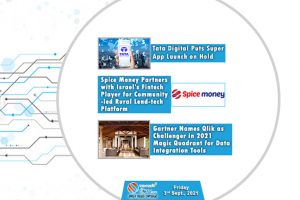Google in Trouble, Embroiled in Antitrust Violations
Dozens of US state attorneys general filed an antitrust lawsuit in federal court against Google, according to an entry in the court docket.
The states have been expected to file a lawsuit saying that the search and advertising giant violates antitrust law in running its app store for Android phones, according to sources familiar with the matter.
The lawsuit, one of a series that has been filed against Google in the United States, follows complaints about Google’s management of its app store, known as the Play Store, even though the company was originally seen as more open than Apple Inc.
Google bans apps with objectionable content from its store, and further requires that some apps use the company’s payment tools and pay Google as much as 30% of their revenue.
Those and related policies prompted criticism from app developers, particularly when Google said it would ramp up enforcement.
Gartner Survey Says over 70% Tech Decision Makers are in Explorative Mode
A Gartner Survey on Technology Buyers and User Behaviour outlines that over 70percent of global technology buyers are exploring more ways to purchase technology this year.
Gartner identified four interesting marketing clusters of technology buying enterprises based on key behaviours that influence go-to-market strategies – the Cooperatives, the Strict Planners, the Catalysts and the Business-Leds.
The Cooperatives make up the largest group of enterprises, representing 43 percent of buyers, but they are also the most challenging to predict. Their cooperative approach often means that they are less clear on what matters most to them
Strict Planners are often coveted as targets due to the clarity with which they define their buying process. They prefer proven technology that aligns to their strategic vision.
Catalysts accept the risk and costs of new technology and deploy as early as possible, but they want assurances and validation that technology will meet their needs.
Lastly, the Business-Led buyers, representing 21 percent of those surveyed, involve the business throughout the entire buying process and seek to ensure that technology drives business value.
Indian SaaS Companies Project USD 1 Trillion Opportunity and Half Million Jobs by 2030
SaasBoomi’s Report on India’s Software-as-a-service (SaaS) industry has made numbers and news over the past day – it has set the stage and context very clear: India’s Saas Industry can reach a whopping $1 trillion valuation and likely employ close to half a million jobs by 2030.
Indian SaaS communities have been one of the beneficiaries of the pandemic as the Indian enterprise embraced digital in full speed. Such digital transformations will drive a 60 percent increase in enterprise tech over the next ten years, the SaasBoomi report said.
The report “Shaping India’s SaaS Landscape” said the global SaaS market is expected to cross $500 billion in revenue by 2025 by growing at 18-20 percent annually. The report also noted that out of nearly a thousand funded SaaS companies in India, 10 have a unicorn status with a valuation of $1 billion. The startups generate about $2-3 billion in revenues and also employ close to 40,000 people.
Out of the ten unicorns eight of them are BrowserStack, a cloud web and mobile testing platform; Freshworks, an online cloud-based customer service; Postman, a collaboration platform; Zenoti, a cloud platform for salons, spas and med spas; Chargebee, a subscription billing software; Highradius, a fintech platform; Icertis, a contract management software and Druva, a data protection firm for the cloud.






















